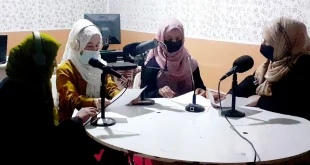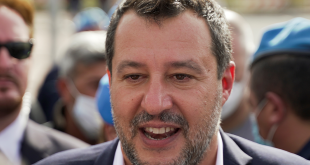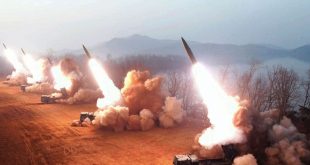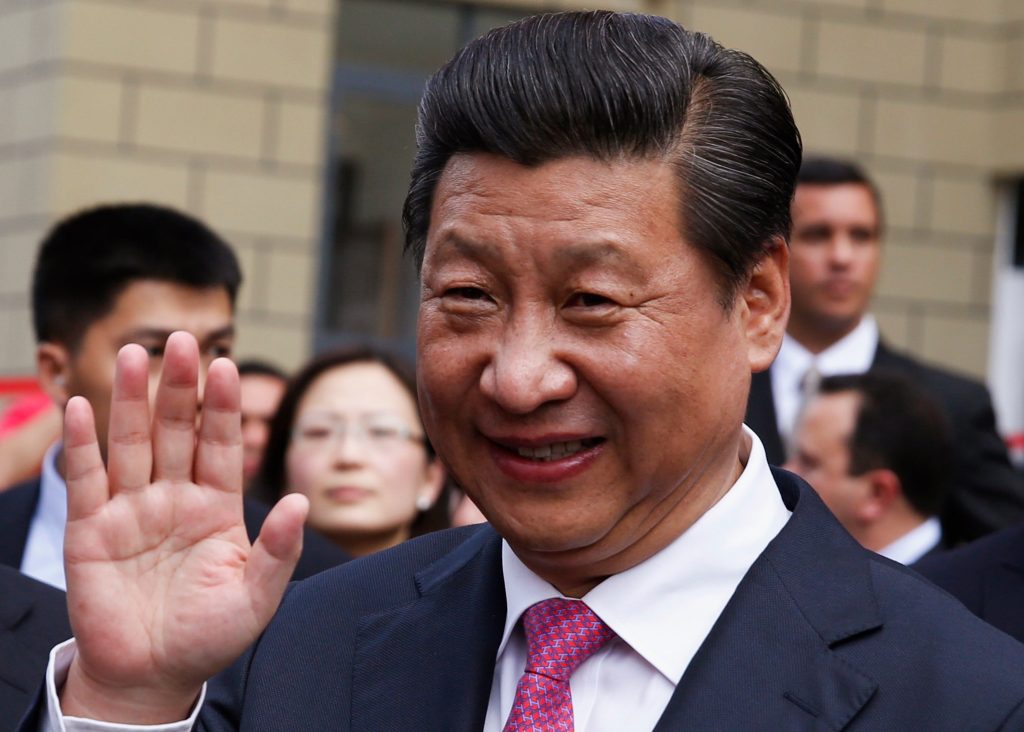
Over the past two decades, China has ramped up its economic ties with nations across Latin America, but it is China’s rising influence in the region that has Washington increasingly concerned.
The growing threat China poses to the U.S. has moved ever forward in the American conscious as defense officials and lawmakers continue to monitor emerging trends from Beijing’s burgeoning relationships worldwide.
China’s quiet expansion in the southern hemisphere has increasingly caught the attention of U.S. defense officials and lawmakers, including Florida Republican Rep. María Elvira Salazar, who last month drew attention to growing security threats emerging from Latin America.
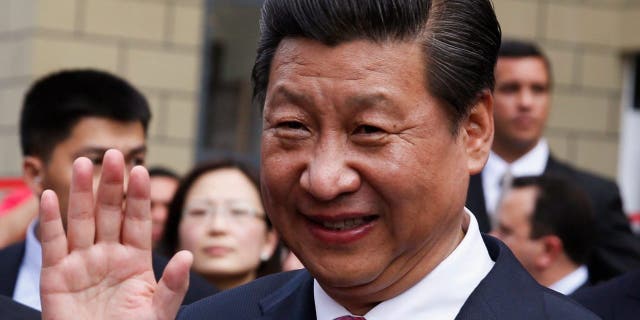
Chinese President Xi Jinping waves during a visit to a housing development in Caracas, Venezuela 2014. The Chinese president has visited Latin America more times over the past decade than former Presidents Obama, Trump and current President Biden combined. (REUTERS/Carlos Garcia Rawlins)
CHINA HOLDS ‘MILITARY ADVANTAGE’ OVER US AS WASHINGTON PREPARES FOR CONFLICT OVER TAIWAN: RETIRED GENERAL
In a House Foreign Affairs Committee hearing, Salazar told lawmakers that Argentina, along with nations like Venezuela and Bolivia, were allowing China to gain a military foothold in Latin America.
“[Chinese President] Xi Jinping has been to Latin America more times than President Obama, Trump and Biden combined in the last 10 years,” Salazar told lawmakers. “The Chinese are not here for trade. They’re here for war.”
The Florida congresswoman pointed to China’s sales of military equipment and arms to the region over the last decade and claimed that Argentina is now considering opening a Chinese fighter jet factory.
Argentina’s Ambassador to the U.S. Jorge Arguello rejected Salazar’s claims earlier this month as false and called them “absurd.”
However, Salazar also drew attention to a Deep Space Station the size of “400 football fields” in the middle of Argentina’s Patagonia desert as another chief security concern.
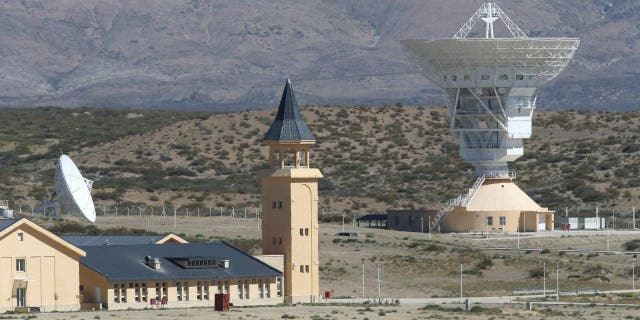
The installations of a Chinese space station are seen in Las Lajas, Argentina, Jan. 22, 2019. (REUTERS/Agustin Marcarian)
“I am sure the Chinese are very interested in studying the stars and every constellation. But the problem is that Argentina has no idea what’s going on there because the Chinese don’t let them in,” she said before questioning whether this program has anything to do with the recent Chinese “balloon” activity over the U.S.
The ambassador scoffed at Salazar’s concerns regarding the space station, saying he has personally visited it and claimed it was akin to another agreement Argentina has with the European Space Agency.
However, one expert on Latin America told Fox News Digital that the U.S. has serious concerns when it comes to this space station.
PUTIN CONGRATULATES CHINA’S XI ON THIRD TERM, PRAISES ‘STRATEGIC COOPERATION’
“We have no clue what takes place there and neither do the Argentinians. We believe that [China’s] using that as a mechanism to monitor our space activity and otherwise be a collector of intelligence,” Juan Cruz, former National Security Council senior director for Western Hemisphere affairs said.
Beijing’s involvement in Latin America stretches far beyond its military interests there.
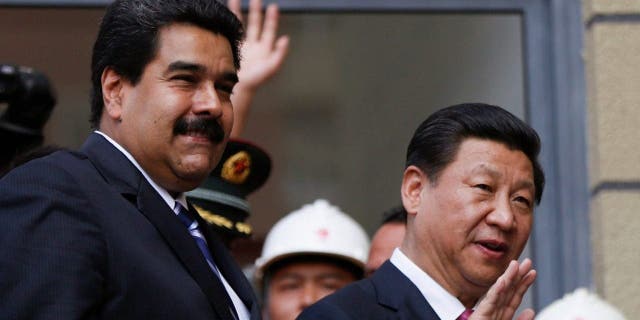
China will provide Venezuela with a $4 billion credit line under an agreement signed on Monday, with the money to be repaid by oil shipments from OPEC member Venezuela. The deal was inked during a 24-hour visit to Venezuela by Chinese President Xi Jinping, right, who is on a tour of Latin America. (REUTERS/Carlos Garcia Rawlins)
China has a “physical presence” in 25 out of 31 Latin American countries and nearly 30% of its global lending goes to Latin America, according to Salazar’s office.
Trade between China and Latin America also grew 26-fold from 2000-2020 – an increase from $12 billion to $315 billion according to the World Economic Forum.
This growth is only expected to keep rising, reaching more than $700 billion a year by 2035.
While the U.S. remains Latin America’s largest trading partner, China is quickly rising to overtake Washington in nearly every field in the region, including in trade, security, tech, and diplomatic relations – a feat it is carrying out largely through soft power.
“We woke up one day and the Chinese were in our neighborhood,” Cruz said. “That displacement takes place not just in business and government [and] diplomatic influence but in terms of technology and what they’re doing around the world with a lot more relevance to U.S. interests.”
Cruz explained that the U.S. has a “crisis oriented” view when it comes to Latin American foreign policy, which generally means Washington pays attention to regions after they are already in trouble or causing an issue for the U.S.
“Chinese investment and Chinese involvement is the opposite,” he said. “They’re investing, and they’re having a role where no one’s looking.”
China first started investing in small local projects throughout Latin America in the late 90s. By the early 2000s with the start of the war on terrorism, China ramped up its investments in places like the Caribbean where former colonial powers were no longer expending as many of their resources.
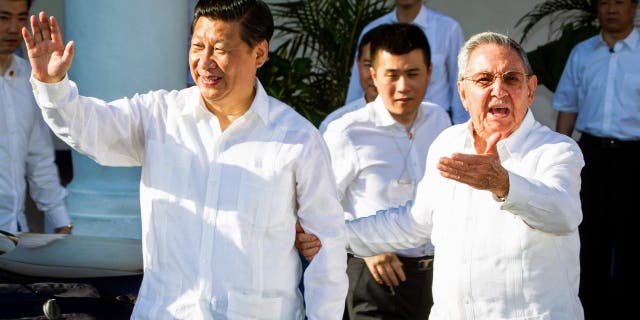
Cuba’s President Raul Castro, right, stands next to Chinese President Xi Jinping, left, in Santiago de Cuba July 23, 2014. Xi ended an eight-day trip through Latin America on Wednesday with a visit to eastern Cuba, where both the island’s independence struggle against Spain and Fidel Castro’s revolution began. (REUTERS/Liu Bin/Pool )
CANADA’S TRUDEAU OPENS INVESTIGATION INTO CHINA ELECTION MEDDLING
Cruz explained that this left a “vacuum” that China stepped in and filled, solidifying itself as a top international player in Latin America.
“That’s how quickly they got into the game and bought their influence,” he said. “They come in with these little projects or insignificant things that you or I diminish the importance of, yet they’re thinking of this in a totally different way.”
American businesses have largely left Latin America for a variety of reasons relating to corruption, legal parameters and other foreign financial incentives.
However, under China’s Belt and Road Initiative, Chinese companies have not only not been deterred by the same hurdles, but they have chosen to invest in projects that do not show obvious or even immediate gains.
“No one makes money off a public utility – that’s why they’re selling them. But the Chinese are buying,” Cruz detailed. “And what’s that get them? It gets noticed. It gets influence.”
However, investing in public infrastructure and technology development not only buys China favor in the region, it opens them up to a certain amount of control.
“The Chinese are brilliant,” Cruz said. “They buy agreements that don’t make money, but it gets…influence that you can’t tabulate.”
U.S. and international defense officials have long warned of the intelligence that China could be collecting through its Huawei infrastructure and the threat this poses to international security.
However, Cruz pointed to another advantage that China gains in acquiring public utility services like water, electric and internet facilities – bargaining chips.
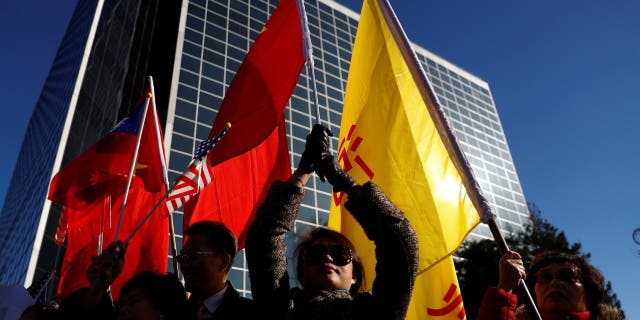
Demonstrators holds flags of China and Taiwan during Taiwanese President Tsai Ing-wen’s stop-over after her visit to Latin America January 2017. (REUTERS/Stephen Lam)
“Do you want another country operating and controlling that kind of infrastructure in your country?” Cruz questioned. “If they wanted they could place a tool in their software that controls your electricity remotely.
“It makes these countries more beholden to the Chinese,” he explained.
CLICK HERE TO GET THE FOX NEWS APP
The influence China appears to be buying in Latin America has security officials concerned by the number of fronts Beijing is inserting itself into, including the acquisition of natural resources, 5G development, space security and major geopolitical hot topics like the security of Taiwan.
“The Chinese playbook is not just one. They have tool after tool after tool that they’re employing,” Cruz said, explaining that it is becoming near impossible to counter China in every sector they are involved in.
“They’ve opened 10 fronts against us. Do we fight on all 10 fronts?” he continued. “Can it be done? I don’t know.”

 Latest Breaking News Online News Portal
Latest Breaking News Online News Portal


